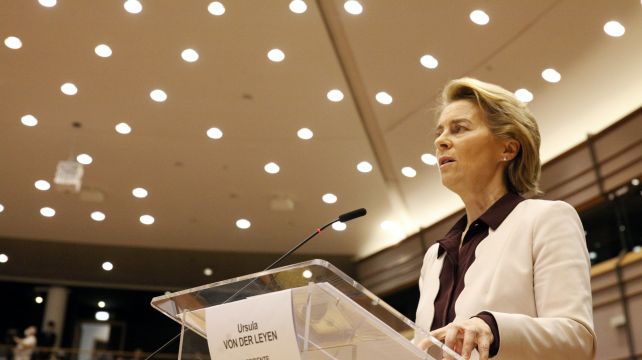In a speech, European Commission President Ursula von der Leyen admitted that the budget deal for the next seven years adopted this week after a four-day EU leaders’s summit features many inadequacies.
The budget worth 1.07 trillion euros (£1 billion) was negotiated in tandem with a 750 billion euro (£672 billion) economic recovery package that aims to help EU countries bounce back from the recession caused by the coronavirus pandemic.
Our values are at the heart of our Union. Protecting our budget & the respect for the rule of law go hand in hand. This is why we'll look into our 2018 rule of law proposal & work with the co-legislators to ensure that our 2018 proposal is taken forward and is improved. #EPlenary pic.twitter.com/adXIn2LU7H
— Ursula von der Leyen (@vonderleyen) July 23, 2020
Hailed as a “historic” moment for Europe by many EU leaders, the deal has however raised concerns among European politicians, who condemned its lack of ambition in the context of the economic crisis triggered by the virus.
A few hours after Ms Von der Leyen’s speech, European politicians adopted a resolution by a large majority that strongly criticises the cuts.
Threatening to withhold their consent if a better agreement is not found during future negotiations, they said the planned cuts will “undermine the foundations of a sustainable and resilient recovery”.
A final vote on the budget at the EU Parliament is not expected to take place before the end of the year.
Ms Von der Leyen said the deal reached this week after a marathon summit was the “light at the end of the tunnel. But with light also comes shadow. And in this case, the shadow comes in the form of a very lean long-term EU budget”.
Many cuts were agreed to under pressure from a group of countries led by the Netherlands known as the “Frugals”, which were also offered large reductions to their contributions to the bloc’s budget to secure a deal.
“There are regrettable and painful decisions on many programs which have crucial European added values,” said Ms von der Leyen.
She deplored the lack of funding for programmes earmarked for research, health, and investment, as well as the limited size of the budget for programmes outside the EU.
“We should always remember that the values of EU programs far outweigh their costs,” Ms von der Leyen insisted.
“Yes, we managed to avoid even further cuts as some member states wanted. But this (budget) is a difficult pill to swallow.”







